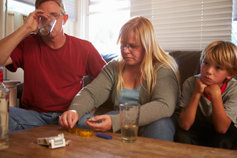How Children are Affected by Drug Addicted Parents
Despite all these tragic losses that result from substance abuse, the most saddening byproduct of substance abuse is the neglect, abuse, and maltreatment of children whose parents are addicted to drugs.
Because addiction and alcoholism alter perception and reality very frequently, children of parents who are chemically dependent are not uncommonly found to be put in harm’s way, neglected or otherwise abused.
Child Abuse Clearly Defined
The terms and circumstances, which define child abuse and neglect, are clearly defined at a federal level. According to the Child Abuse Prevention and Treatment Act, the mistreatment of children is defined as:
Any recent act or failure to act on the part of a parent or caregiver, which results in death, serious physical or emotional harm, sexual abuse or exploitation, or an act or failure to act which presents an imminent risk of serious harm.

What could this mean in the case of children put in danger by way of drug abuse in the home? While even just exposing children to dangerous and illegal drugs could easily be considered maltreatment, additional abuse or neglect may manifest in any of the following ways:
- Violence or verbal abuse resulting from being drunk or high
- Sexual abuse or behavior which makes a child feel uncomfortable
- Forcing a child to hide an adult’s drug abuse or alcoholism
- Consistently leaving a child alone at home
- Consistently ignoring a child or their needs; lack of attention
The Long-term Effects of Childhood Exposure to Drug Use
Studies exist and have been completed which focus on the long-term effects of substance abuse on the youth who are present. A shocking number of currently detained prison inmates and rehab attendees admit they had a tumultuous upbringing, having experienced some sort of neglect, or physical, sexual or verbal abuse. Further, these individuals were aware of criminality or substance abuse in their environment, setting a powerfully negative example for such youth.
It is wholly observable that children who grow up amongst drug abuse, alcoholism and criminality tend to join in these activities.This creates something of a cyclic trend, making those children who are born into underprivileged homes and neighborhoods more likely to remain ‘in the system’ than those children who are born of better circumstances with attentive, drug-free parents.
Breaking the Cycle, What Can I Do
As we look at analyzing how drug-addicted parents affect children, we conclude that the most important focus of this issue is breaking the cycle of substance abuse amongst youth. Many youths have entered into drug and/or alcohol abuse paths of their own, largely due to their exposure to such activities as a young child. However, this cycle can be taken apart and the course of youth lives can be changed.
- Support local children and family centers; these groups offer a safe environment and supportive care to children when parents are unable to.
- Demand drug education in all schools in your area; although drug prevention begins in the home, having preventative education at a young age continues to be an effective way to keep kids off drugs.


